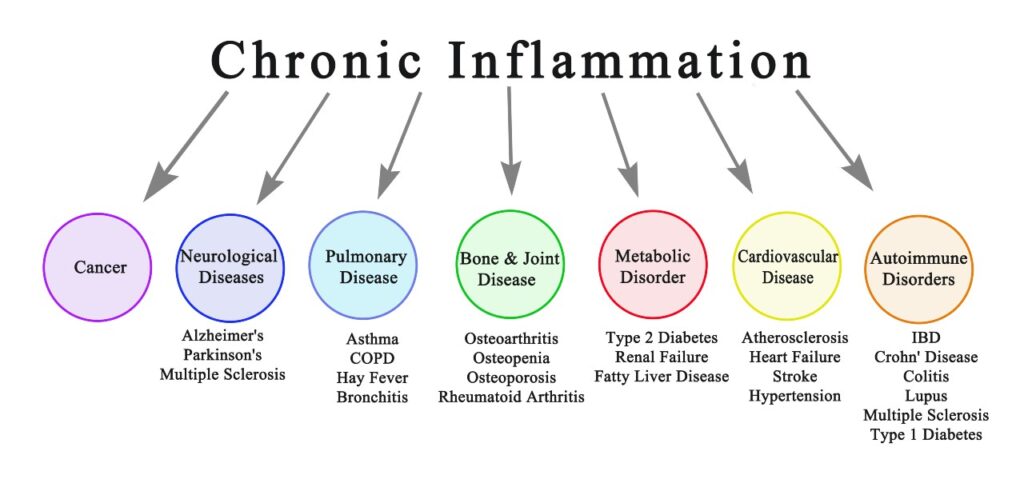It’s no secret that chronic inflammation can wreak havoc on our bodies, causing joint pain, headaches, and even contributing to chronic diseases like heart disease and diabetes.
Fortunately, there are some fairly quick ways to reduce inflammation in the body. In this article, we explain the fastest methods to combat inflammation and restore your body to a healthy state.
(Note: in the this article, we’re referring to chronic, low-level inflammation rather than to acute inflammation caused by an injury to a specific part of the body).

1. Get plenty of sleep to allow your body time to recover and reduce inflammation
Sleep is maybe the most direct path to quickly reducing system inflation in the body.
When we sleep, our bodies go into repair mode and begin to restore cellular damage caused by daily stressors. In fact, research has shown that lack of sleep can increase inflammation and put us at a higher risk for chronic conditions like heart disease and diabetes. Getting enough shut-eye also helps our immune system function properly, keeping us better protected against illness.
So, first step to reducing inflammation: take a nap or go to sleep for the night.
2. Use topical treatments such as essential oils or cold packs to help relieve inflammation
When dealing with inflammation, it’s easy to reach for over-the-counter or prescription medications. However, there are natural solutions that can provide relief almost as quickly without the potential side effects of medication.
Topical treatments such as essential oils and cold packs can be a gentle and effective way to address inflammation. Essential oils have anti-inflammatory properties, and can be applied directly to the affected area or used in aromatherapy. Cold packs can also help to reduce swelling and alleviate discomfort.
While these methods might not offer immediate relief like medication, they can be used regularly without risking negative impacts on the body. Incorporating topical treatments into your pain management plan may provide additional benefits and support overall health.
3. Drink plenty of fluids, especially water, to help flush toxins from the body and reduce inflammation
Staying hydrated is important for countless bodily functions, and it can also have a major impact on our overall health and well-being. Drinking plenty of fluids helps to flush toxins from the body, promoting organ function and reducing the risk of inflammation.
But not all fluids are created equal — while sugary drinks may quench your thirst temporarily, they can actually have detrimental effects on your health. On the other hand, plain old water is the best choice for staying hydrated and maintaining your body’s natural balance.
4. Practice stress management techniques to reduce inflammation
When we experience stress, our bodies release hormones like cortisol that can increase inflammation and hinder the immune system’s ability to fight off illness. That’s why it’s important to incorporate stress management techniques into our daily lives.
Whether it’s mindfulness meditation, deep breathing exercises, or physical activity, finding ways to reduce stress can quickly reduce inflammation and improve overall health. Don’t wait until your body is in a constant state of inflammation — start incorporating stress management methods into your routine now for better long-term wellbeing.
Exercise regularly to improve circulation and reduce inflammation
While it is commonly known that exercise can improve cardiovascular health and help with weight management, there are also many lesser-known benefits to getting regular physical activity. One of these is the improvement of circulation and reduction of inflammation in the body.
Believe it or not, this one actually work pretty quick.
When we exercise, our muscles contract and blood pumps more efficiently throughout the body, carrying essential oxygen and nutrients to cells. This improved circulation can reduce inflammation and reduce discomfort in joints and other areas of the body. In addition, regular exercise has been shown to enhance immune function, promoting a faster response to infection and illness.
Eat a healthy diet that is low in inflammation-causing foods
Eating a healthy diet can have a direct impact on inflammation in our bodies.
Your body’s natural response to injury or infection, inflammation can become chronic if triggered by factors like smoking, stress or a poor diet. Foods high in trans fats, refined carbohydrates and processed meats can contribute to this kind of chronic inflammation.
On the other hand, a diet low in these inflammatory foods and rich in fruits, vegetables, whole grains and healthy fats can actually help to reduce inflammation.
Eating salmon, walnuts, berries, etc.— you should experience a fairly rapid anti-inflammatory response.
Take supplements such as fish oil or turmeric to help reduce inflammation throughout the body
Fish oil, rich in omega-3 fatty acids, has been shown to have anti-inflammatory effects, while turmeric contains the compound curcumin, which has been found to reduce inflammation in the body.
In addition to maintaining a balanced diet and managing stress levels, incorporating these natural supplements into your routine can help lessen the harmful impacts of inflammation on your overall health and well-being.
As with diet, you probably won’t see result overnight, but you should notice benefits within days or weeks.





